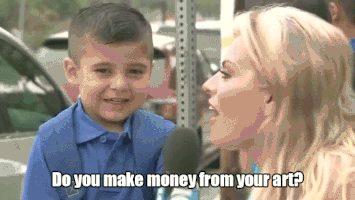Feed a Starving Artist: School them in Blockchain (part 2)

Image by Tamlyn Blasdale-Holmes
Previously on this blog ... we posited new ways that blockchain technology, and Steemit in particular, can open up new revenue streams for nonprofit organizations as well as individual artists. If you recall, I am working with a cohort of grad students at Temple University to explore how narratives can be monetized for nonprofits on Steemit. We now need to figure out who is most receptive and suitable to partner with us to figure out the best way to demonstrate the viability of cryptocurrency fundraising and social action.
I propose that the best way to utilize roughly 10,000 worth of SD would be to create a program to train artists on how to leverage Steemit and blockchain technology to build a bigger audience and create new revenue streams. Teach the artists of today how to fish in tomorrow's pools so that their art making is more sustainable. Funding programs and brick and mortar buildings is so 20th century. It's time we start playing with 21st century paradigms like the attention economy and fund people and engaged communities of practice.
The Problem
It's difficult to make a living as an artist, musician, or performer. Most grants and awards are project based which means that practicing artists supplement their income with employment in other fields. What if there was a way for artists to generate income by sharing their art making process rather than just selling the results? Like the craftsman guilds of the Middle Ages, artists organized into specialized groups to find communal and professional security. The competitive nature of our economy and hostile government support of the arts makes it imperative to arm our artists with information so that they can create more work that challenges and reflects our world.
.gif)
Suggested Solution
What if there was a program to train and consult a cohort of artists to leverage Steemit and other blockchain technologies to generate new sources of income that they never had before? Funding would be dispersed through one of the following Philadelphia nonprofits whose mission is to support local artists:
The Painted Bride ("We value artists and their role as carriers of culture and tradition and guides to living creatively.")
In Liquid ("Committed to creating opportunities and exposure for visual artists while serving as a free, online, public hub that showcases Philadelphia’s vast visual arts culture.")
The Woodmere Musuem ("Telling the Story of Philadelphia's art and artists.")
Once a sponsoring organization is selected they will elect five members of their community who are actively engaging in art making and already have a web presence of some kind so that baseline metrics can be accessed. This cohort of artists will attend four workshops over the course of six weeks. The workshops will be led by a Steemit incubator like @sndbox and or other digital design specialists to assist participants in creating a presence, portfolio, and social media strategy for Steemit and other blockchain tools.
Following a determined period of time, including assessments and feedback from the participants, a case study will be generated to present the findings of this project. SEO and web analytics will be utilized to measure the before and after impact of these activities on artists' previously existing sites.
Intended Outcomes
Building a community of practice on blockchain platforms like Steemit offers artists a new revenue stream, a dynamic peer group, and an expanded audience. By piloting a blockchain literacy program for artists, the Philadelphia community can demonstrate innovate ways to nurture our creative economy and culture. We can provide a direct service to individual art makers AND boost the culture of Philly by supporting the reputation of our city as a place where artists can thrive.
I'm still fleshing out the idea and the details of the program. So if you have any suggestions feel free to comment below!
100% of the SBD rewards from this #explore1918 post will support the Philadelphia History Initiative @phillyhistory. This crypto-experiment conducted by graduate courses at Temple University's Center for Public History and MLA Program, is exploring history and empowering education. Click here to learn more.
Nice post and thanks for the information
Establishing a local "community of practice" on this platform is a great idea:
But who or what organization has the capacity or interest in conducting these workshops?